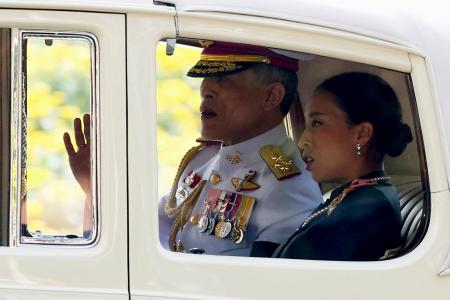
BANGKOK (Reuters) – Thailand’s defence minister said on Wednesday authorities will investigate the BBC on suspicion of insulting the monarchy in connection with a Thai-language profile of the new king that has stirred social media anger.
Offending the dignity of a reigning monarch, known by the French term lese-majeste, is a serious crime under Thai law and offenders can be punished with up to 15 years in prison.
The constitutional monarchy has been in the international spotlight since King Bhumibol Adulyadej died on Oct. 13 at the age of 88, after seven decades on the throne.
His son was proclaimed King Maha Vajiralongkorn Bodindradebayavarangkun on Thursday last week and BBC Thai, the BBC’s Thai-language service, published a profile of him online.
The piece was widely shared on social media and some Thais have said its content was insulting to the new king.
“Authorities have to pursue the matter. It is their duty to pursue anything that is against the law,” Defence Minister Prawit Wongsuwan told reporters.
The BBC declined to comment.
The Thai Ministry of Digital Economy blocked a link to the profile on the BBC’s Thai website on Tuesday and it remained blocked on Wednesday. A message on the site said it was blocked for “inappropriate content”.
Anyone can file a lese-majeste complaint against another person and police always investigate such cases, rights groups say.
Plainclothes police and some soldiers in uniform went to the BBC’s office in Bangkok on Tuesday, witnesses said. No BBC staff were there at the time and the officers later left.
The BBC’s television coverage of Thailand has been repeatedly blocked since the death of King Bhumibol.
Police said they would investigate the content of the profile of the new king.
“Then we’ll proceed according to the law,” senior police official Chayapon Chatchaidej told reporters.
He said nobody had filed a complaint against the BBC.
Police on Saturday arrested a Thai democracy activist opposed to the military government that has been in power since a 2014 coup for sharing a link to the BBC profile.
He was later released on bail.
The military government has zealously pursued cases of alleged criticism of the monarchy since it took power.
International rights groups say the lese-majeste law leave too much room for interpretation and that the penalties are too severe.
(Reporting by Aukkarapon Niyomyat, Amy Sawitta Lefevre and Pracha Hariraksapitak; Writing by Patpicha Tanakasempipat; Editing by Amy Sawitta Lefevre and Robert Birsel)











